1964 General Election
Hugh Gaitskell, the leader of the Labour Party, was taken ill in December, 1962, and was taken to Middlesex Hospital, London. It was not until several weeks later that the doctors became aware he was suffering from the rare disease systemic lupus erythematosus. It can lie dormant for years, emerging from time to time in a different organ, or suddenly erupting everywhere as it did with Gaitskell. Both his heart and lungs were initially affected but then the disease attacked every critical organ at once and died on 18th January 1963. (1)
George Brown was expected to become the new leader but was defeated by Harold Wilson. He had disapproved of the way that Gaitskell had treated left-wing members of the party and one of his first acts as leader was to restore the whip to the little band of rebels who had been expelled two years before for their attitude on unilateralism. However, he had to go slowly. He told his left-wing intimates, Richard Crossman, Barbara Castle and Michael Foot: "You must understand that I am running a Bolshevik Revolution with a Tsarist Shadow Cabinet." (2)
Wilson was only 47 years-old when he became leader. He might have looked old when he was alongside John F. Kennedy, who was a year younger, but was seen as young when compared to the 70 year-old Harold Macmillan, the leader of the Conservative Party. Wilson went to visit Kennedy in March, 1963. Wilson told one of his close friends that he hoped to "persuade them that a Labour Government would not necessarily be anti-American or very far on the Left". In a speech to the Washington Press Club he argued: "We stand firmly by NATO and the Western Alliance. We are not a neutralist party and neutralism has no part or place in our policies." (3)
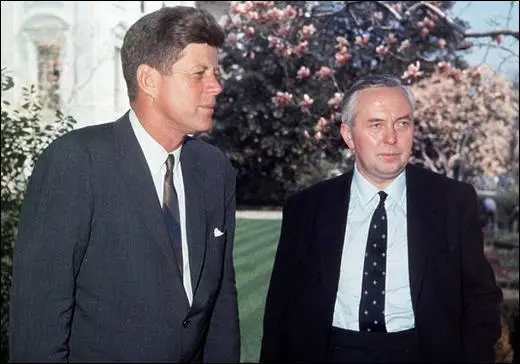
Wilson had a long meeting with Kennedy where they discussed several issues including the negotiations with Charles de Gaulle on British entry to the Common Market. Wilson told Kennedy "we shouldn't do too much appeasing; we should recognise that we had some very strong cards in our own hand." Wilson was impressed by the tremendous speed of the President's mind: "One never had to explain anything, never had to go back over the previous sentence... We were both talking shorthand. Behind each point was a paragraph or a chapter that didn't need to be said." (4)
John Profumo Scandal
On 10th March, 1963, George Wigg, the Labour MP for Dudley, told Harold Wilson and a group of friends, including Richard Crossman, Barbara Castle and Michael Foot that he had received information from John Lewis, the former MP for Bolton West, that John Profumo, the Minister of Defence, was having a sexual relationship with the model Christine Keeler, who was involved with Eugene Ivanov, the military attaché at the Soviet Embassy, and a man believed to be a KGB officer. That night Crossman wrote: "When we arrived at the party George outlined the story to us and we emphatically and unanimously repudiated it. We all felt that even if it was true and Profumo was having an affair with a call girl and that some Russian diplomat had been mixed up in it, the Labour Party simply should not touch it. I remember that we all advised Harold very strongly against it and in a way rather squashed George." (5)
On 17th March, Christine Keeler failed to appear as prosecution witness at the Old Bailey trial of a West Indian concerning a shooting incident in West London. Wigg told Wilson that the story was about to break and he should raise the matter in the House of Commons. Wilson liked Profumo and refused to make political capital out of his private life. Wigg later recalled: "Wilson's attitude indicated that he wanted to play it cool. He invited me to pursue the subject on my own responsibility." (70)
George Wigg got up in the House of Commons on 21st March and asked Home Secretary Henry Brooke, during a debate on the John Vassall affair: "I rightly use the Privilege of the House of Commons - that is what it is given me for - to ask the Home Secretary who is the senior member of the Government on the Treasury Bench now, to go to the Dispatch Box - he knows that the rumour to which I refer relates to Miss Christine Keeler and Miss Davies and a shooting by a West Indian - and, on behalf of the Government, categorically deny the truth of these rumours.... It is not good for a democratic State that rumours of this kind should spread and be inflated, and go on. Everyone knows what I am referring to, but up to now nobody has brought the matter into the open. I believe that the Vassall Tribunal need never have been set up had the nettle been firmly grasped much earlier on. We have lost some time and I plead with the Home Secretary to use that Dispatch Box to clear up all the mystery and speculation over this particular case." Richard Crossman then commented that Paris Match magazine intended to publish a full account of Keeler's relationship with John Profumo, the Minister of War, in the government. Barbara Castle also asked questions if Keeler's disappearance had anything to do with Profumo. (7)
The following day John Profumo issued a statement: "I understand that in the debate on the Consolidated Fund Bill last night, under the protection of parliamentary privilege, the Hon. Gentlemen the Members for Dudley (George Wigg) ... spoke of rumours connecting a Minister with a Miss Keeler and a recent trial at the Central Criminal Court. It was alleged that people in high places might have been responsible for concealing information concerning the disappearance of a witness and the perversion of justice. I understand that my name has been connected with the rumours about the disappearance of Miss Keeler. I would like to take this opportunity of making a personal statement about these matters. I last saw Miss Keeler in December 1961, and I have not seen her since. I have no idea where she is now. Any suggestion that I was in any way connected with or responsible for her absence from the trial at the Old Bailey is wholly and completely untrue. My wife and I first met Miss Keeler at a house party in July 1961, at Cliveden. Among a number of people there was Doctor Stephen Ward whom we already knew slightly, and a Mr Ivanov, who was an attaché at the Russian Embassy.... Between July and December, 1961, I met Miss Keeler on about half a dozen occasions at Doctor Ward's flat, when I called to see him and his friends. Miss Keeler and, I were on friendly terms. There was no impropriety whatsoever in my acquaintanceship with Miss Keeler." (8)
On 26th March, Stephen Ward sent a message to Wigg asking for him to contact him by telephone. "Ward, it appeared, had been agitated by my comment in a television programme the previous evening that the real issue involved was security. He rambled on about persons and places. I cut him short with an intimation that I was not interested in private lives, but if he wanted to talk about security I would meet him in the Central Lobby at 6 p.m." Ward then provided a statement that insisted that Profumo was lying about his relationship with Keeler." (9)
Ward discovered that in an attempt to keep him quiet he was going to be charged with several counts of living off immoral earnings. On 19th May, 1963, Stephan Ward wrote a letter to Harold Wilson, the Home Secretary Henry Brooke, the leader of the Labour Party, Harold Wilson, and his local M.P., William Wavell Wakefield. "I have placed before the Home Secretary certain facts of the relationship between Miss Keeler and Mr Profumo since it is obvious now that my efforts to conceal these facts in the interests of Mr Profumo and the Government have made it appear that I myself have something to hide - which I have not. The result has been that I have been persecuted in a variety of ways, causing damage not only to myself but to my friends and patients-a state of affairs which I propose to tolerate no longer." (10)
As a result of his earlier statement the newspapers decided not to print anything about John Profumo and Christine Keeler for fear of being sued for libel. However, George Wigg refused to let the matter drop and on 25th May, 1963, once again raised the issue of Keeler, saying this was not an attack on Profumo's private life but a matter of national security. Harold Macmillan responded by ordering an investigation into the matter. (11)
On 5th June, John Profumo resigned as War Minister. In his statement he admitted he had lied to the House of Commons about his relationship with Christine Keeler. "In my statement (on 22nd March) I said there had been no impropriety in this association. To my very deep regret I have to admit that this was not true, and that I misled you and my colleagues and the House." (12) The next day the Daily Mirror said: "What the hell is going on in this country? All power corrupts and the Tories have been in power for nearly twelve years." (13)
In the debate that took place on the Profumo scandal, Wilson had to be very careful in the way he attacked the government. He wanted to discredit Macmillan but had no wish to destroy him. He told Richard Crossman that he did not want Macmillan to resign as he feared he would be replaced by the much younger, Reginald Maudling: "Macmillan... is our most valuable asset... The one thing I am really frightened of is Maudling." Crossman agreed: "As long as he had Macmillan opposite him, old, effete, worn out, a cynical dilettante, the contrast between Harold's character and Macmillan is an overwhelming advantage to Harold and the Labour Party." (14)
It was generally agreed that Wilson's attack on Macmillan in the House of Commons was very impressive. Crossman wrote his his diary: "Harold made an absolutely magnificent speech, the best I've ever heard him make, better than I thought possible. It was really annihilating, a classical prosecution speech, with weight and self-control." (15) Merlyn Rees, a newly elected MP, recalls being "immensely impressed by the way Wilson could put the boot in on issues like this." (16)
Macmillan suffered further embarrassment when Edward Heath on 1st July, 1963, announced in the House of Commons that Kim Philby was indeed a double agent working for the Soviet authorities during his time with the foreign office and he had managed to escape to Moscow and join up with two other spies, Guy Burgess and Donald Maclean. "Since Mr Philby resigned from the Foreign Service in 1951, twelve years ago, he has had no access of any kind to any official information." (17) Soviet newspapers disputed this and Izvestia, the official government newspaper, claimed that Philby had been divulging British secrets, and those of her allies for thirty years. (18)
Macmillan asked Wilson not to call for a debate on this highly sensitive issue. Worried that he would resign if forced to answer questions on this issue, he agreed. That night Macmillan wrote to Wilson: "Thank you so much for the way you dealt with the Philby Questions this afternoon. I hope you will allow me to say, with all respect, that your contribution was a great help to the cause of national security. I am most grateful." (19) Wilson replied: "We shall have no doubt, a number of other exchanges on this and other security subjects, and I hope we shall be able to handle them in this way." (20)
At first Macmillan resisted attempts within his party to resign. However, he had to go into hospital on 10th October, 1963, for a minor operation and even though his doctor said it would not prevent him from continuing as prime minister, he decided to use this opportunity to leave office on medical grounds. Rab Butler was expected to become the next prime minister but his name was rejected by Macmillan, because he believed he lacked the "capacity for decision-making." (21)
Macmillan also rejected the idea that Reginald Maudling, Iain Macleod, Quintin Hogg (Lord Hailsham) or Enoch Powell, should become the next prime minister. On 18th October, MacMillan sent a message to the Queen that he was resigning and advised her to ask Home to form a new government. He immediately resigned his peerage and won a by-election at Kinross and Western Perthshire and became known as Sir Alec Douglas-Home. At first, Butler, Maudling and Hailsham refused to serve under Home, because of his lack of experience on the "home front". In the end they all changed their mind. However, two of his greatest critics, Macleod and Powell, refused to back down, arguing that the Conservatives could not win a general election led by someone with his aristocratic background. (22)
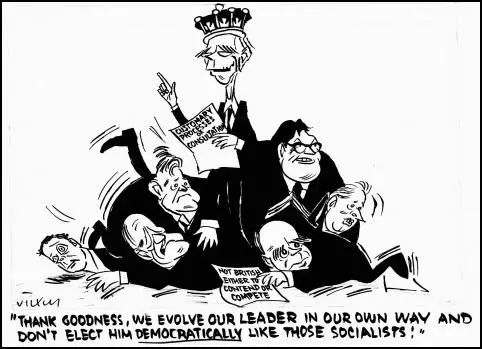
Harold Wilson, when he heard the news, he wrote to a friend that he was "almost ecstatic with pleasure". It was not that he underestimated Douglas-Home between the two men could be exploited. For example, in an interview that he gave to a newspaper, he admitted that he did his sums with matchsticks. "Nothing could encapsulate more neatly his superior claim to be the man who could tackle Britain's economic problems... Wilson was lower middle-class against aristocratic, innovator against traditionalist, statistician against self-avowed innumerate... technocrat against territorial magnate, Montagu Burton against Savile Row or scruffy tweeds, professional against amateur, the future against the past." (23)
Scientific Revolution
Patrick Blackett, the distinguished physicist, had been friends with Harold Wilson for many years. His left-wing socialist views, including his opposition to nuclear weapons, undermined his influence in the Labour Party under Clement Attlee and Hugh Gaitskell. Blackett formed a pro-socialist science group that included John Desmond Bernal, B. V. Bowden, C. P. Snow, Peter Ritchie Calder, Howard Florey, Jacob Bronowski, Dudley Maurice Newitt and Ben Lockspeiser. Blackett told Richard Crossman that he was delighted by the outcome of the leadership contest as now "scientists would have a chance in the party." (24)
Wilson decided to make science and important factor of his campaign to become the next prime-minister. At that year's annual conference at Scarborough Wilson made a speech on socialism and technology. He insisted that the growth of automation made it important that we developed a socialist society as under private enterprise it would only lead to high employment. He explained the need for more scientists and this meant an expansion in Britain's educational institutions. Wilson envisaged these scientists being deployed on industrial research, and, with the help of state funding, encouraging new public industries to revive the British economy. (25)
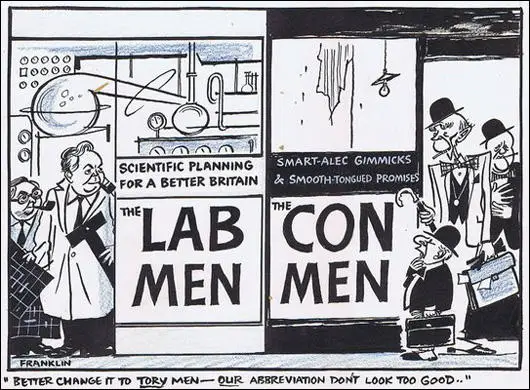
Harold Wilson suggested that he was the figure of the future. Under his leadership Britain would experience a second industrial revolution: "Planning on an unprecedented scale to meet automation without unemployment; a pooling of talent in which all classes could compete and prosper; a vast extension of state-sponsored research; a completely new concept of education; an alliance of science and socialism." (26) Robert McKenzie, a political scientist and BBC broadcaster, told radio listeners that "Harold Wilson had moved Labour Party forward fifty years." (27)
James Cameron wrote the next day in The Daily Herald: "Harold Wilson's startling essay into political science-fiction may well be held by experts to be the most vital speech he has ever made. Here at last was the twentieth-century." (28) John Cole, the Guardian correspondent agreed: "The Labour Party's attempt to marry socialism and science in full view of the electorate was given a superb start today by Mr Harold Wilson, who made the best platform speech of his career. The annual conference has not previously been a happy hunting-ground for Mr. Wilson, who prefers the intimacy of the Commons for his subtler shafts of scorn and wit." (29)
On a visit to the United States, Wilson told American journalists: "We have a reservoir of unused and underused talent, of skill and craftsmanship, of inventiveness, and ingenuity, of administrative ability and scientific creativeness which if mobilised will... enable us to become - not the workshop of the world; that is no longer our role - but the pilot plant, the toolroom of the world." (30)
In 1964 Wilson published The Relevance of British Socialism where he argued in favour of the mixed economy with "an expansion of common ownership substantial enough to give the community power over the commanding heights of the economy". This included the renationalisation of steel, the public ownership of water supply, the expansion of existing public industries and the development of new industries in the public sector. (31)
1964 General Election
The Labour Party had been leading the Conservative Party in the monthly Gallup poll from August 1961. After his election as party leader, the lead increased to 15.5 per cent. However, this popularity was undermined when the chancellor, Reginald Maudling, conciliated voters by engineering a pre-election boom through his spring Budget; as a result, although industrial output stagnated and the trade gap widened, people felt more optimistic as the election approached. (32)
Tony Benn, a former television producer, and Marcia Williams, his private secretary, urged Wilson to appear on television as much as possible. Williams later told Michael Cockerell that it was very important to get Wilson on television and "people's homes and to do that you had to be like someone they would know." Wilson "had the sort of background that everyone in those days were aspiring to". By appearing on television "he was on your screen, he was in your home and you could identify with him." (33)
Tom Driberg, became Wilson's unofficial adviser on appearing on television. It was decided to present himself as the common man, in contrast to the untelegenic Sir Alec Douglas-Home. Wilson was always seen with a pipe, though he smoked cigars in private. It was even used in television interviews, as a protective device, and would light his pipe, to give himself more time if he was asked a difficult question. He also wore spectacles, but he made sure he was never photographed or filmed with them on. (34)
Mary Wilson gave an interview to Godfrey Smith, of The Sunday Times, where she presented her husband as ordinary man: "It would be a complete waste of time doing any fancy cookery for Harold, risottos for instance. Yes, it's true he prefers tinned salmon. Anyway, we wouldn't afford smoked salmon. Harold cooks a very nice breakfast. He's good with sausages and things. But I wouldn't trust him with the joint. If Harold has a fault it is that he will drown everything with H.P. sauce." This appeared to work and the polls showed that Wilson had a 20 per cent lead over Douglas-Home. (35)
Labour began as favourites at the beginning of the 1964 General Election campaign but a vicious attack on Wilson by the right-wing press in the few weeks before the election saw the Conservatives edge ahead. Wilson appealed to the BBC to provide some balance. Wilson pressed for the political element of the daily programme Today's Papers to be suspended during the election period, on the ground that the papers were predominantly Tory. The BBC refused and Wilson felt this had a major impact on the final result. Several newspapers also ran stories suggesting that Wilson was having an affair with Marcia Williams. (36)
Wilson had more success when he protested to the Director-General, Hugh Greene, that the immensely popular Steptoe and Son was being screened an hour before the polls closed. He claimed that these viewers would more likely to be Labour voters. When Greene postponed the programme by an hour Wilson telephoned in gratitude: Thank you very much, Hugh. That will be worth a dozen or more seats to me." If that was the case, it won him the election because by the time they finished counting the votes, Wilson had an effective majority of five. (37)
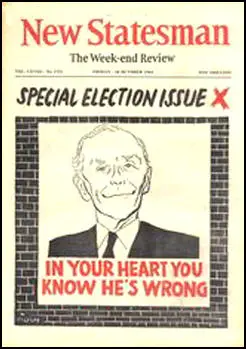
Some Conservative Party candidates played the race-card during the election. This included Peter Griffiths, who was taking on Patrick Gordon Walker, the Shadow Foreign Secretary, in Smethwick. The constituency had the highest percentage of recent immigrants to England and during the campaign his supporters used the slogan "If you want a ****** for a neighbour, vote Liberal or Labour". Walker found it difficult to deal with this issue as the local Labour Club did not allow black people to become members. (38)
Griffiths himself did not coin the phrase or approve its use, but he refused to disown it. "I would not condemn any man who said that, I regard it as a manifestation of popular feeling". Griffiths reminded the electorate that Walker had opposed the introduction of the 1962 Commonwealth Immigration Act. “How easy to support uncontrolled immigration when one lives in a garden suburb,” Griffiths sneered at his Labour rival during the general election campaign. Griffiths won the seat with a 7.2 % swing to the Conservatives and reduced Walker's vote from 20,670 in the previous election to 14,916. (39)
In the 1964 General Election the Labour Party obtained a swing of 3% to obtain victory. As Philip Ziegler pointed out: "Fewer people had voted, Labour in 1964 than in I959, even though the electorate was a larger one. A revived Liberal Party had secured some two million extra votes, some from Labour, more from the Tories. The Liberals in a sense had won the election for Harold Wilson. An overall Tory majority of almost a hundred had been overturned, to be replaced by so overall Labour majority of five." (40)
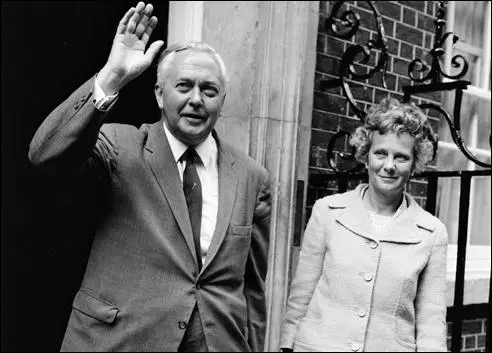
Harold Wilson, the new prime minister, was furious with the defeat of Patrick Gordon Walker and called on Sir Alec Douglas-Home, the leader of the Conservative Party, to condemn the racist campaign of Peter Griffiths as he had previously agreed that the political parties would not exploit anti-immigrant feelings during the election. Wilson later wrote: "I asked him, then and there, to get up and say whether he endorsed the successful Conservative candidate, Peter Griffiths, or whether he repudiated the means by which he had entered the House. If the former, I said, then Sir Alec would have fallen a long way from the position he had taken up. If the latter, then the honourable member for Smethwick would, for the life-time of Parliament, be treated as a parliamentary leper. This created an immediate outcry and some Conservatives walked out in protest." (41)
Political Parties | Total Votes | % | MPs |
|---|---|---|---|
12,002,642 | 43.4 | 304 | |
3,099,283 | 11.2 | 9 | |
12,205,808 | 44.1 | 317 | |
46,442 | 0.2 | 0 |
Primary Sources
(1) Harold Wilson, speech in Glasgow (8th September, 1963)
Today I want to outline new proposals on which we are working, a dynamic programme providing facilities for home study to university and higher technical standards, on the basis of a University of the Air and of nationally organized correspondence college courses.
These will be intended to cater for a wide variety of potential students. There are technicians and technologists who perhaps left school at sixteen or seventeen and who, after two or three years in industry, feel that they could qualify as graduate scientists or technologists. There are many others, perhaps in clerical occupations, who would like to acquire new skills and new qualifications. There are many in all levels of industry who would desire to become qualified in their own or other fields, including those who had no facilities for taking GEC at 0 or A level, or other required qualifications; or housewives who might like to secure qualifications in English Literature, Geography or History.
(2) Harold Wilson, speech at the Labour Party Conference (1st October, 1963)
The problem is this: since technological progress, left to the mechanism of private industry and private property, can lead only to high profits for a few, a high rate of employment for a few and to mass redundancy for the many, if there had never been a case for socialism before, automation would have created it. Because only if technological progress becomes part of our national planning can that progress be connected to national ends.
So the choice is not between technological progress and the kind of easygoing world we are living in today. It is the choice between the blind imposition of technological advance, with all that means in terms of unemployment, and the conscious, planned, purposive use of scientific progress to provide undreamed of living standards and the possibility of leisure ultimately on an unbelievable scale.
Now I come to what we must do, and it is a four-fold programme. First, we must produce more scientists. Secondly, having produced them, we must be a great deal more successful in keeping them in this country. Thirdly, having trained them and kept them here, we must make more intelligent use of them when they are trained than we do with those we have got. Fourthly, we must organize British industry so it applies the results of scientific research more purposively to our national production effort. Russia is at the present time training ten to eleven times as many scientists and technologists. And the sooner we face up to that challenge the sooner we shall realize what kind of a world we are living in.
Until very recently over half our trained scientists were engaged in defence projects or so-called defence projects. Real defence, of course, is essential. But so many of our scientists were employed on purely prestige projects that never left the drawing-board. Many more scientists are deployed not on projects that are going to increase Britain's productive power, but on some new gimmick or additive for some consumer product which will enable the advertising managers to rush to the television screen to tell us all to buy a little more of something we did not even know we wanted in the first place. This is not strengthening Britain.
What we need is new industries, and it will be the job of the next Government to see that we get them. This means mobilizing scientific research in this country to produce a new technological breakthrough. We have spent thousands of millions in the past few years on misdirected research and development contracts in the field of defence. If we were now to use the technique of R and D contracts in civil industry I believe we could within a measurable period of time establish new industries which would make us once again one of the foremost industrial nations of the world.
Relevant also to these problems are our plans for a University of the Air. I repeat again that this is not a substitute for our plans for higher education, for our plans for new universities and for our plans for extending technological education. It is not a substitute; it is a supplement to our plans. It is designed to provide an opportunity for those, who, for one reason or another, have not been able to take advantage of higher education, to now do so with all that the TV and radio state-sponsored correspondence courses, the facilities of a university for setting and marking papers, conducting examinations and awarding degrees, can provide. Nor, may I say, do we envisage this merely as a means of providing scientists and technologists. I believe a properly planned University of the Air could make an immeasurable contribution to the cultural life of our country, to the enrichment of our standard of living.
